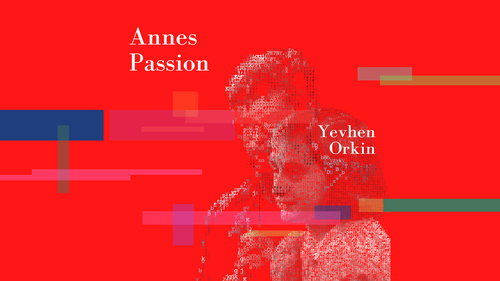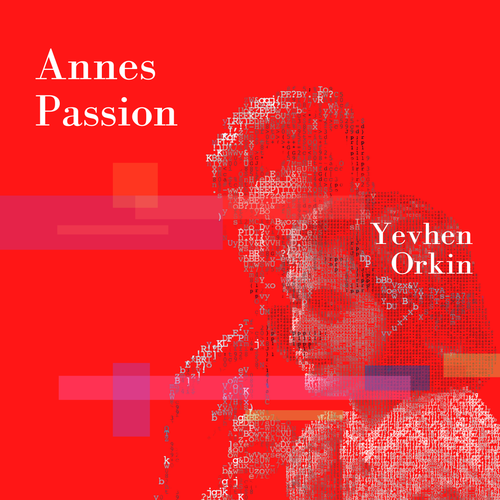"I don't think about all the suffering. I think about the beauty that remains" - Anne Frank, from the "Diary"
Even in the darkest periods of world history, there is still room for the light in the human soul: for love and mercy, for wisdom and gratitude, for courage and supernatural strength! Records of the famous "Diary of Anne Frank" by the Jewish girl Anneliese Maria Frank (1929-1945) render the thirst for life, girlish fragility, and childish maturity. Fearing for their lives, the Frank family emigrated from Weimar to Amsterdam in 1933, after Hitler came to power. The persecution of Jews during the occupation of the Netherlands forced them to hide from the Gestapo for two years. It was there that a 13-year-old girl, full of dreams, and hopes began to keep a diary, which she called "Het Achterhuis" (in the back house). In the future, this notebook was to become evidence of numerous Nazi war crimes. Unfortunately, the horrors of the Holocaust did befall the family, it was killed in the Bergen-Belsen concentration camps. The only survivor was Anna's father, Otto Frank. It was he who edited and published the diary in memory of his daughter.
Yevhen Orkin - on this story - based the libretto of his first oratorio, "Annes Passion", which consists of an overture and 20 parts, including arias, recitatives, ensembles, and choral episodes. The idea to write an oratorio appeared in 2016. In 2018, Yevhen began his work on it, which lasted about a year. The masses and passions of Johann Sebastian Bach became exemplary for the composer. One can feel the connection between Bach`s genius and the time during listening to the music.
The powerful musical setting deepens the effect of the stories that a little girl with a big heart once secretly wrote in her diary. Both complex in its plot and theme, the work in the musical sense is remarkably vivid and original. Here the vocal tradition of bel canto coexists with the recitative sprechgesang, and its contemporary sound shares place with baroque motifs. Although the genre of oratorio does not involve staging, Yevhen Orkin's music is surprisingly colorful and theatrical: a lively street, a small room, a loud conversation, a cold silence. The image of Anna is quite dramatic, in a wide emotional range, which makes a terrific impression on the listener, similar to baroque affects. The heroine is experiencing evolution and development from child to girl in her way. The girl is deprived of many necessary components of the life of an ordinary teenager. She grows up too fast and early, so does she pass away.
The process of creating a record of the oratorio is of particular professional interest and admiration. It was done during the quarantine years 2020-2021. It's hard to believe, but this high-quality and balanced performance you are going to hear in the release is the result of the composer's careful work with score editing software and recordings of individual (!) instrumental and vocal parts. This means that the performers did not work together, but only separately with the conductor, microphone, and prepared soundtracks. In fact, the traditional performance of "Annes Passion" has not yet taken place. Nevertheless, we have a unique opportunity to hear the full version of Yevhen Orkin's "Passions for Anna" in the Ukrainian Live Classic app.
Performed by: Otto Frank – Hans-Jürgen Thoma, Anne Frank – Barbara Cramm, Frau van Daan – Debora van Straaten, Margot Frank – Ida Adele Orkin, Frau Frank – Olga Orkin, Helmuth Silberberg – Yevhen Orkin, Herr Dussel, Herr van Daan – Stanislav Rosenberg, Lockdown Soloists Orchestra and Choir, Conductor - Yevhen Orkin.
April 2022
Yevhen Orkin - on this story - based the libretto of his first oratorio, "Annes Passion", which consists of an overture and 20 parts, including arias, recitatives, ensembles, and choral episodes. The idea to write an oratorio appeared in 2016. In 2018, Yevhen began his work on it, which lasted about a year. The masses and passions of Johann Sebastian Bach became exemplary for the composer. One can feel the connection between Bach`s genius and the time during listening to the music.
The powerful musical setting deepens the effect of the stories that a little girl with a big heart once secretly wrote in her diary. Both complex in its plot and theme, the work in the musical sense is remarkably vivid and original. Here the vocal tradition of bel canto coexists with the recitative sprechgesang, and its contemporary sound shares place with baroque motifs. Although the genre of oratorio does not involve staging, Yevhen Orkin's music is surprisingly colorful and theatrical: a lively street, a small room, a loud conversation, a cold silence. The image of Anna is quite dramatic, in a wide emotional range, which makes a terrific impression on the listener, similar to baroque affects. The heroine is experiencing evolution and development from child to girl in her way. The girl is deprived of many necessary components of the life of an ordinary teenager. She grows up too fast and early, so does she pass away.
The process of creating a record of the oratorio is of particular professional interest and admiration. It was done during the quarantine years 2020-2021. It's hard to believe, but this high-quality and balanced performance you are going to hear in the release is the result of the composer's careful work with score editing software and recordings of individual (!) instrumental and vocal parts. This means that the performers did not work together, but only separately with the conductor, microphone, and prepared soundtracks. In fact, the traditional performance of "Annes Passion" has not yet taken place. Nevertheless, we have a unique opportunity to hear the full version of Yevhen Orkin's "Passions for Anna" in the Ukrainian Live Classic app.
Performed by: Otto Frank – Hans-Jürgen Thoma, Anne Frank – Barbara Cramm, Frau van Daan – Debora van Straaten, Margot Frank – Ida Adele Orkin, Frau Frank – Olga Orkin, Helmuth Silberberg – Yevhen Orkin, Herr Dussel, Herr van Daan – Stanislav Rosenberg, Lockdown Soloists Orchestra and Choir, Conductor - Yevhen Orkin.
April 2022
Text: Victoria Antoshevska
Translated into English by Taras Demko
Translated into English by Taras Demko
Listen to music
Слухати музику
Performed by:
Otto Frank – Hans-Jürgen Thoma,
Anne Frank – Barbara Cramm,
Frau van Daan – Debora van Straaten,
Margot Frank – Ida Adele Orkin,
Frau Frank – Olga Orkin,
Helmuth Silberberg – Yevhen Orkin,
Herr Dussel, Herr van Daan – Stanislav Rosenberg,
Lockdown Soloists Orchestra and Choir, Conductor - Yevhen Orkin
Annes Passion
Євген Оркін
"Я не думаю про всі страждання. Я думаю про красу, яка все ще залишається" – Анна Франк, зі “Щоденника”
Навіть у найтемніші періоди світової історії усе ж знаходиться місце для світла людської душі: для любові і милосердя, для мудрості і вдячності, для відваги і надлюдської сили! Таку жагу до життя, дівочу тендітність, попри це, недитячу зрілість містять записи знаменитого “Щоденника Анни Франк”, який вела єврейська дівчинка Аннеліза Марія Франк (1929-1945). Охоплена страхом за своє життя сім’я Франк емігрувала з Веймара до Амстердама ще в 1933 році, після приходу Гітлера до влади. Переслідування євреїв під час окупації Нідерландів змусило їх протягом двох років переховуватися від гестапівців у потайному приміщенні. Саме там 13-річна дівчина, сповнена мрії, надій, а разом з тим, важких переживань, почала вести щоденник, який назвала “Het Achterhuis” (у перекладі - "У задньому будинку"). У майбутньому цей записник мав стати доказом численних воєнних злочинів нацистів. На превеликий жаль, жахи Голокосту усе ж спіткали родину, яка була знищена у концентраційних таборах Берген-Бельзена. Єдиним, хто вижив, був батько Анни – Отто Франк. Саме він відредагував і видав щоденник у пам’ять про доньку.
Євген Оркін взяв цю історію за основу лібрето своєї першої ораторії “Annes Passion” (“Страсті за Анною Франк”), яка складається з увертюри та 20 номерів, серед яких арії, речитативи, ансамблі та хорові епізоди. Задум написати ораторію з’явився ще у 2016 році. У 2018 Євген розпочав роботу над твором, яка тривала близько року. Зразковими для композитора стали меси та пасіони Йогана Себастьяна Баха. Зв’язок з епохою цього генія відчувається під час прослуховування.
Талановите музичне втілення поглиблює психологізм тих історій, які колись потайки писала у своєму щоденнику маленька дівчинка з великим серцем. Скомплікований за своєю ідейно-сюжетною формою твір у музичному сенсі так само строкатий та самобутній. Тут вокальна традиція bel canto співіснує поруч з речитативним sprechgesang, а в сучасному звучанні знаходиться місце для барокових мотивів. Хоча жанр ораторії не передбачає сценічної постановки, музика Євгена Оркіна напрочуд барвиста і театральна (подекуди звукозображальна): в уяві чітко постає то жвава вулиця, то маленька кімната, то голосна розмова, то холодне мовчання. Образ Анни досить драматичний, у широкому емоційному діапазоні, що справляє на слухача приголомшливе враження, подібне до барокових афектів. Її героїня переживає еволюцію та становлення від дитини до дівчини, щоправда у відмінний спосіб, адже дівчина позбавлена багатьох необхідних компонентів життя звичайного підлітка. Надто швидко і непередбачувано вона дорослішає, надто рано вона змушена попрощатися з життям.
Особливого професійного інтересу та слів захоплення заслуговує процес створення запису ораторії, який припав на карантинні 2020-2021 роки. Важко повірити, але це якісне й збалансоване виконання яке ви чуєте у релізі – результат кропіткої роботи композитора з програвачами нотних редакторів та записами окремих (!) інструментальних та вокальних партій. Це значить, що виконавці працювали не разом, а лише окремо з диригентом, мікрофоном та підготовленими звуковими доріжками. Фактично, традиційне виконання “Annes Passion” ще не відбулося. Попри це, маємо унікальну нагоду почути повну версію “Страстей за Анною” Євгена Оркіна у додатку Ukrainian Live Classic.
Євген Оркін взяв цю історію за основу лібрето своєї першої ораторії “Annes Passion” (“Страсті за Анною Франк”), яка складається з увертюри та 20 номерів, серед яких арії, речитативи, ансамблі та хорові епізоди. Задум написати ораторію з’явився ще у 2016 році. У 2018 Євген розпочав роботу над твором, яка тривала близько року. Зразковими для композитора стали меси та пасіони Йогана Себастьяна Баха. Зв’язок з епохою цього генія відчувається під час прослуховування.
Талановите музичне втілення поглиблює психологізм тих історій, які колись потайки писала у своєму щоденнику маленька дівчинка з великим серцем. Скомплікований за своєю ідейно-сюжетною формою твір у музичному сенсі так само строкатий та самобутній. Тут вокальна традиція bel canto співіснує поруч з речитативним sprechgesang, а в сучасному звучанні знаходиться місце для барокових мотивів. Хоча жанр ораторії не передбачає сценічної постановки, музика Євгена Оркіна напрочуд барвиста і театральна (подекуди звукозображальна): в уяві чітко постає то жвава вулиця, то маленька кімната, то голосна розмова, то холодне мовчання. Образ Анни досить драматичний, у широкому емоційному діапазоні, що справляє на слухача приголомшливе враження, подібне до барокових афектів. Її героїня переживає еволюцію та становлення від дитини до дівчини, щоправда у відмінний спосіб, адже дівчина позбавлена багатьох необхідних компонентів життя звичайного підлітка. Надто швидко і непередбачувано вона дорослішає, надто рано вона змушена попрощатися з життям.
Особливого професійного інтересу та слів захоплення заслуговує процес створення запису ораторії, який припав на карантинні 2020-2021 роки. Важко повірити, але це якісне й збалансоване виконання яке ви чуєте у релізі – результат кропіткої роботи композитора з програвачами нотних редакторів та записами окремих (!) інструментальних та вокальних партій. Це значить, що виконавці працювали не разом, а лише окремо з диригентом, мікрофоном та підготовленими звуковими доріжками. Фактично, традиційне виконання “Annes Passion” ще не відбулося. Попри це, маємо унікальну нагоду почути повну версію “Страстей за Анною” Євгена Оркіна у додатку Ukrainian Live Classic.
Виконавці: Отто Франк - Ганс-Юрген Тома, Анна Франк - Барбара Крам, Пані фон Даан - Дебора фон Страатен, Марго Франк - Іда Адель Оркін, Пані Франк - Ольга Оркін, Гельмут Сільберберг - Євген Оркін, Герр Дуссель, Герр фон Даан - Станіслав Розенберг;
Lockdown Soloists Orchestra and Choir, диригент Євген Оркін.
Lockdown Soloists Orchestra and Choir, диригент Євген Оркін.
Текст: Вікторія Антошевська


